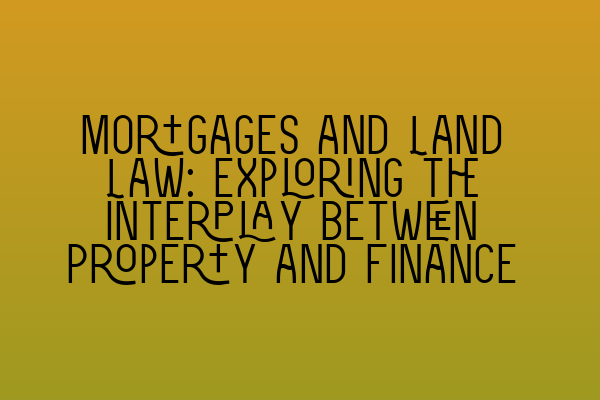Mortgages and Land Law: Exploring the Interplay between Property and Finance
Welcome to the SQE Property Law & Land Law blog, where we delve into the intricate world of property law and its relationship with finance. In this article, we will explore the interplay between mortgages and land law, shedding light on the key concepts and legal principles that govern property transactions involving mortgages. Whether you are a solicitor, law student, or someone with a keen interest in property and finance, this blog post aims to provide you with a comprehensive understanding of this fascinating subject.
Before we delve into the details, let us take a moment to address the importance of having a solid foundation in property law. As you prepare for the SQE exams, it is crucial to equip yourself with the necessary knowledge and resources. To that end, we highly recommend checking out our article on essential SQE textbooks [44. Essential SQE Textbooks: Building a Solid Foundation for Exam Prep] for recommendations on building a strong knowledge base.
Now, let us begin our exploration of mortgages and their relationship to land law.
What is a Mortgage?
A mortgage is a legal instrument that allows a borrower to secure a loan by using their property as collateral. In simple terms, it is a financial agreement between a borrower (mortgagor) and a lender (mortgagee), wherein the borrower pledges their property as security for the loan.
Types of Mortgages
There are several types of mortgages, each with its own set of legal implications. Some common types include:
1. Fixed-Rate Mortgage: This is the most straightforward type of mortgage, where the borrower pays a fixed interest rate for the entire loan term.
2. Adjustable-Rate Mortgage (ARM): An ARM has an interest rate that may vary over time, usually tied to a specific financial index. This type of mortgage can offer more flexibility but also presents greater risks.
3. Interest-Only Mortgage: With an interest-only mortgage, the borrower only pays the interest on the loan for a specified period. After this period, the borrower must repay the principal as well.
Mortgages and Land Law
Now, let us explore the interplay between mortgages and land law. When a property is mortgaged, it creates a complex legal relationship that affects the rights and obligations of both the mortgagor and the mortgagee.
One crucial principle in land law is that a mortgage creates an interest in the property for the mortgagee. In other words, the mortgagee acquires a legal interest in the property, allowing them to enforce their rights in case of default by the mortgagor.
Furthermore, land law recognizes two types of mortgage:
1. Legal Mortgage: A legal mortgage involves the transfer of the legal title of the property to the mortgagee, effectively creating a legal relationship between the parties.
2. Equitable Mortgage: An equitable mortgage does not involve the transfer of legal title. Instead, it creates an equitable interest in the property, giving the mortgagee certain rights and remedies.
These distinctions are crucial because they determine the rights and obligations of the parties involved, as well as the remedies available in case of default.
Importance of Understanding Mortgages and Land Law
As a solicitor specializing in property law, it is essential to have a comprehensive understanding of the interplay between mortgages and land law. Successfully navigating this complex legal landscape requires a sound knowledge of the relevant legal principles and case precedents.
For law students preparing for the SQE exams, understanding mortgages and land law is vital. The SQE exams assess a wide range of skills and knowledge, including the ability to identify and analyze legal issues related to property transactions.
If you are interested in learning more about the skills assessed in the SQE exams, we recommend reading our article on understanding the exam content [39. Skills Assessed in SQE: Understanding the Exam Content]. This article provides valuable insights into the skills and knowledge required to excel in the SQE exams.
Conclusion
Mortgages and land law are intricately intertwined, with each impacting the other in significant ways. As solicitors specializing in property law, having a solid understanding of this interplay is crucial for providing effective legal advice and representation to clients.
We hope this blog post has shed some light on the subject and deepened your understanding of mortgages and land law. If you have any further questions or would like to discuss this topic in more detail, please do not hesitate to contact us at SQE Property Law & Land Law.
And if you are interested in exploring other essential topics related to the SQE exams, we encourage you to check out our other informative articles, such as our roadmap to success in the SQE stages [43. Unraveling the SQE Stages: A Roadmap to Success], convenient test centers for the SQE exams [41. Test Centers for SQE: Convenient Locations for the Exam], and the comparison between SQE1 and SQE2 [47. SQE1 vs. SQE2: Comparing the Two Stages of the Exam].
Thank you for reading, and we wish you the best of luck in your studies and professional endeavors in property law and land law!
